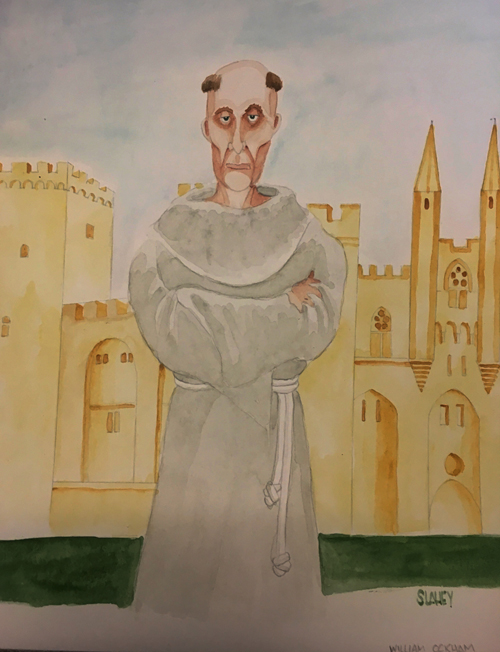
Your complimentary articles
You’ve read one of your four complimentary articles for this month.
You can read four articles free per month. To have complete access to the thousands of philosophy articles on this site, please
Philosophical Haiku
William of Ockham (1285-1347/8 CE)
by Terence Green
A pauper’s philosophy –
Only things exist.
Excise the excess.

Ockham © Stephen Lahey
William from Ockham (or Occam), an otherwise obscure village in Surrey, England, was the greatest philosopher of the fourteenth century. Known as the Doctor Invincibilis, he didn’t care whom he offended, and with his rough and ready style of argument, he offended plenty of people – which eventually got him into big trouble.
He became a Franciscan monk, an order famous for its commitment to poverty. But this meant he was at risk of having idle hands (one of poverty’s unacknowledged benefits), and so doing the Devil’s work. To avoid this calamity, he wrote widely on logic, physics, and theology.
Today he is most often associated with ‘Ockham’s Razor’, his idea that explanations should be as simple as possible (alternative formulations of this principle include ‘Entities should not be multiplied beyond necessity’ and ‘It is futile to do with more things that which can be done with fewer’). Frankly, this is a good rule of thumb whatever you’re thinking about. As an application of this principle, he also taught that the only things that exist are individual entities such as this chair, that table, the tree over there, and so on: there is no universal Chair or Table or Tree from which the physical entities draw their essence (pace Plato).
Having already been condemned as a heretic in 1326 for having unorthodox views, since he argued against Aquinas’s philosophy, he didn’t help himself when in 1328 he sided with those who argued against the Pope that Jesus and his disciples didn’t own any property. This was obviously a matter of considerable importance to the Pope, who owned a lot of property. Seeing what was coming (imprisonment and execution), William took refuge with the Holy Roman Emperor in Bavaria. Excommunicated, but feeling a bit safer, he wrote polemics against the Pope’s claim to temporal power, thus emulating Dante.
The invincible teacher was finally beaten around 1347/48, probably by the Black Death. The Pope had died earlier, in 1334, still owning lots of property, just like Jesus.
© Terence Green 2019
Terence is a writer, historian, and lecturer, and lives with his wife and their dog in Paekakariki, NZ.









